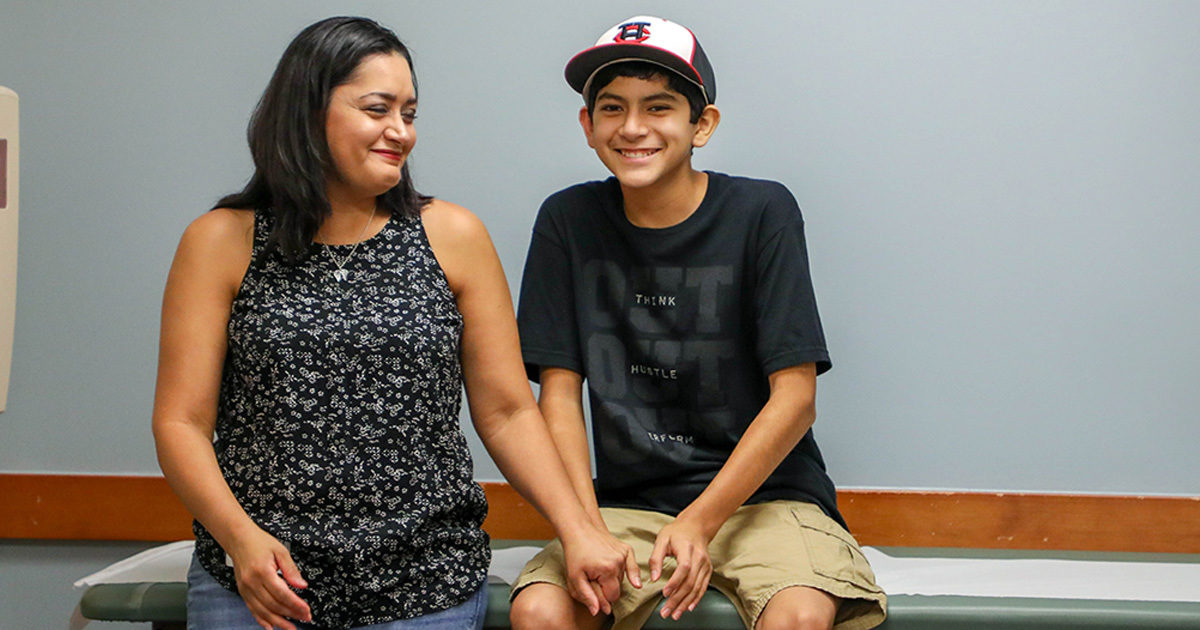Joaquin’s Story of Survival
One 13-year-old boy hopes his story will help save other kids like him

Joaquin is an energetic 13-year-old boy who loves playing sports, particularly baseball; you can see the excitement in his eyes as he explains what it was like when he hit his first home run. His mom, Kim, and dad, Adam, are, of course, his biggest cheerleaders at his baseball games. However, about a year and a half ago Joaquin began experiencing sudden chest pains and difficulty breathing while playing sports, which caused him and his family serious concern.
Joaquin’s dad explains his symptoms as “episodes” that would occur during or after Joaquin had practice or a game. His parents began tracking his symptoms and the number of episodes Joaquin experienced and decided to seek out help from a variety of medical specialists. “After multiple tests, everything came back clear, he was initially diagnosed with exercise induced asthma and we started him on an albuterol treatment before practice,” says Adam.
Joaquin continued to play sports with the help of an inhaler but after about six months the chest pains and difficulty breathing returned, and he even began passing out on the field, Adam explains. His coaches knew about his occasional episodes and were extra careful not to put too much stress on him during practice. Joaquin often didn’t run as hard or as much in order to avoid having an episode.
One evening in September 2018, Joaquin decided he wanted to run with the rest of his team during baseball practice. “He had a great practice,” says Adam, “but suddenly while running at the end, he signaled to me by raising his hand, which lets me know that he’s having issues, and at that point I took off running towards him.” Joaquin began experiencing intense chest pains, but this time was very different. He asked for his inhaler but the symptoms didn’t pass, he felt faint, couldn’t breathe easily and didn’t want to move.
Adam helped Joaquin to the car, decided this incident wasn’t like the others, and made the decision with his wife to take him to Dell Children’s Medical Center Emergency Room for immediate treatment. Within 10 minutes of arriving at the emergency room, Joaquin’s symptoms worsened. A variety of test were conducted until a blood test finally revealed elevated numbers of a certain enzyme that is produced when there is stress to the heart. “It was crushing. As a parent, deep in the back of your mind, you know there is something else more serious happening,” says Adam. It was determined that Joaquin was experiencing a severe, life-threatening cardiac event caused by an anomaly to the left coronary artery that needed treatment as soon as possible.
Carlos Mery, MD, UT Health Austin Congenital Heart Surgeon practicing at Dell Children’s Medical Center, was able to take over Joaquin’s case and proceed with an emergency open-heart surgery to correct the defect in the heart. “His condition was very serious,” says Dr. Mery, “but after the operation there was significant improvement in function and he was able to go home five days after the surgery.” Dr. Mery explains that preliminary studies show about 0.6 to 0.9% of the population have this type of condition and the risk of dying is not very high, however events like Joaquin’s can occur and are serious, sometimes fatal.
Since conditions similar to Joaquin’s are very rare, they can be very difficult to diagnose. There are heart screenings that are recommended for young athletes to help detect heart defects and programs like the Texas Center for Pediatric and Congenital Heart Disease are being established to continue research into these conditions to better diagnose and treat patients throughout their lifetime.
“Joaquin will continue to be followed for the rest of his life like anyone who has a serious open-heart surgery,” says Dr. Mery, “but we feel optimistic that after this, he will be able to play any sport he wants and will live a long and healthy life.”
Joaquin and his family are grateful for the treatment they received at Dell Children’s Medical Center and are advocating for other families and children who may be experiencing the same challenges. “I hope that other kids are able to find out what’s wrong with them if they have the same issues, it will save their lives,” says Joaquin, who’s looking forward to returning to the baseball field after clearing his three month check-up soon.
For more information about the Texas Center for Pediatric and Congenital Heart Disease or to request an appointment at Dell Children’s Medical Center, please visit here or call 1-855-324-0091.